Oracle is the 80th largest company in the world, having brought in $50 billion in sales in the latest fiscal year. Like other tech companies of its size, it achieved this status by providing a diverse range of products and services. As such, it faces fierce competition in many digital arenas, from cloud computing to database management.
This article explores some of the key players challenging Oracle in various industries. Whether you’re an Oracle user, on the hunt for an alternative, or just curious about the competitive landscape, read on to find out who’s fighting the tech giant for market share.
Who are Oracle’s biggest competitors?
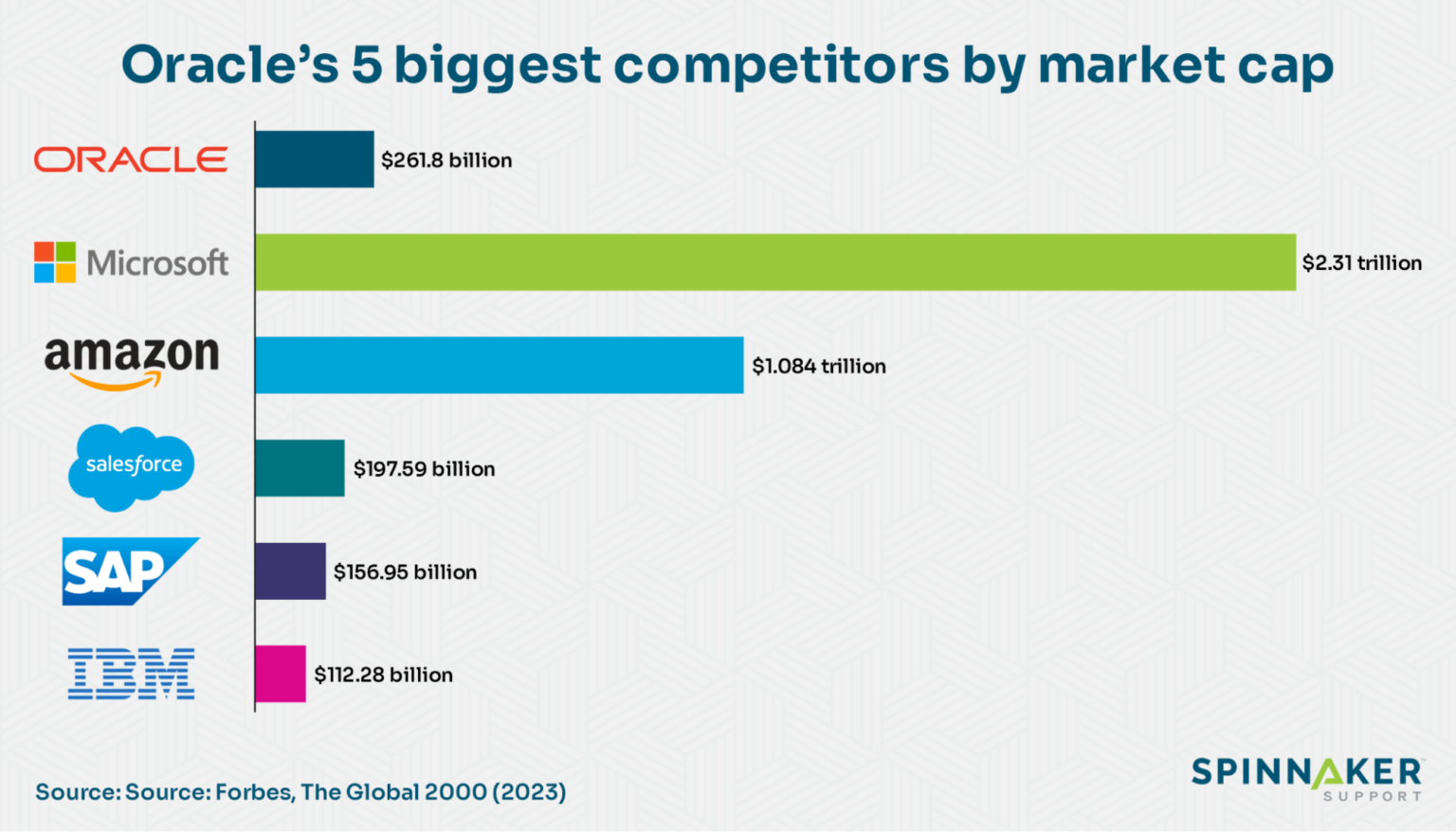
Oracle’s biggest competitors are other tech companies that target enterprise customers with business-oriented products and services. They include:
1. Microsoft
Founded: 1975
Founders: Bill Gates, Paul Allen
Headquarters: Redmond, Washington
Revenue: $211.9 billion
Value: $2.56 trillion
Employees: 221,000
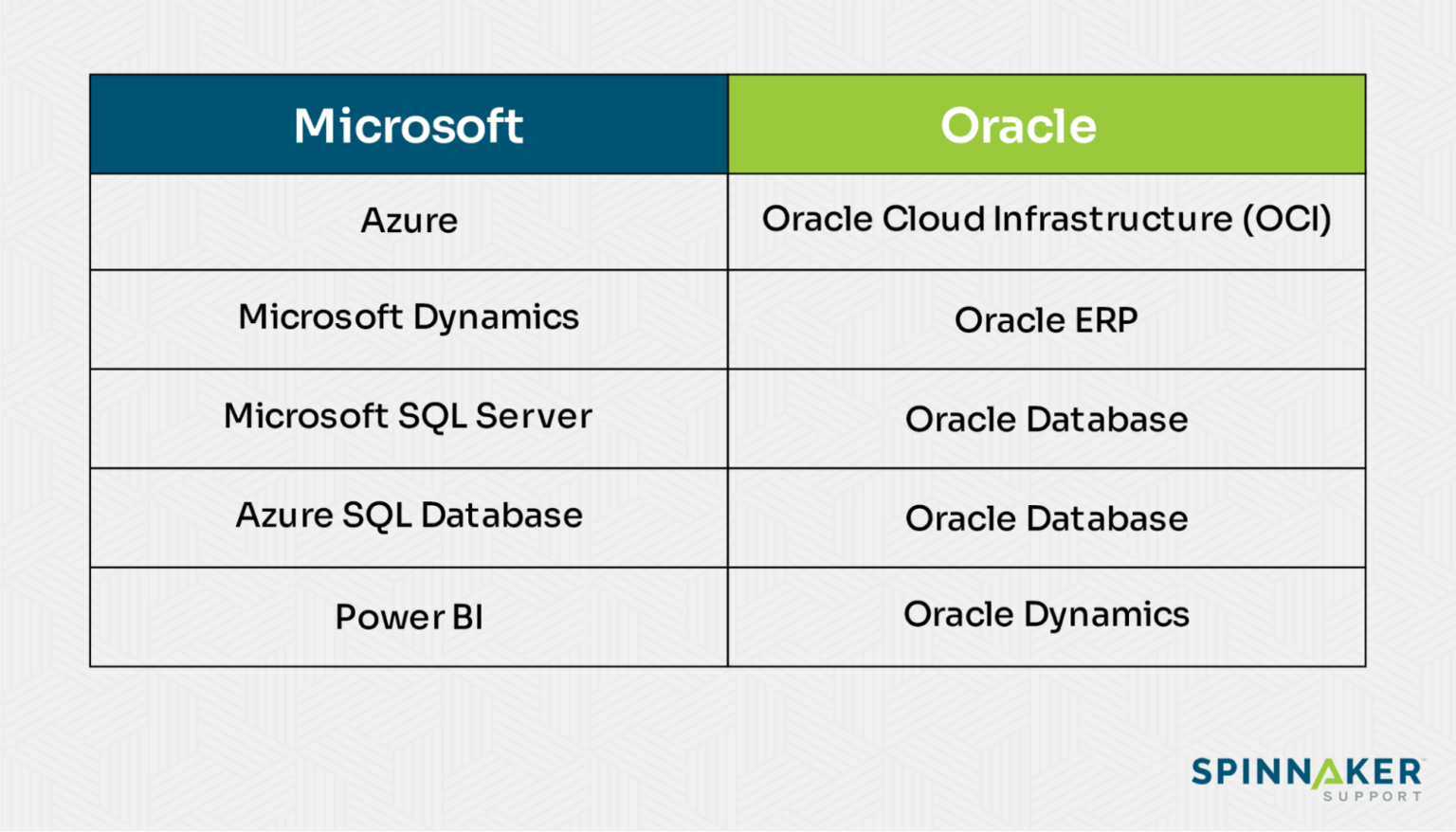
Microsoft is one of Oracle’s oldest competitors, with a rivalry that dates back to the 1970s when both companies were formed. As the second-largest company in the world, with a $2.6 trillion value, it’s arguably Oracle’s biggest competitor. Some of Microsoft’s products and services that compete directly with Oracle include:
Microsoft Azure
Azure is Microsoft’s public cloud platform, a rival to Oracle Cloud Infrastructure (OCI). While OCI’s focus is databases, Azure targets users looking for more computational power at scale.
One of the reasons you should consider Azure over OCI is because it’s used by more IT professionals so it’d be easier to adopt. It has also been around longer so, aside from having a larger existing user base, it brings more advanced functionality, especially with automation and better support for IoT.
Microsoft Dynamics
Microsoft Dynamics is a collection of enterprise resource planning (ERP) tools designed to help companies run their business processes. Dynamics 365 is the company’s alternative to Oracle ERP, and is made up of applications that handle procurement, human resources, supply chain management, finance, manufacturing, and more.
Microsoft SQL Server
Microsoft SQL Server, a competitor to Oracle Database, is a relational database management system (RDBMS). While it supports some enterprise Linux platforms, SQL Server is built primarily to run on Microsoft Windows. Oracle Database, on the other hand, supports Windows, Linux, and Unix.
Depending on your needs, these differences might be negligible or the business breakthrough you’ve been looking for — our SQL Server consultants could help you determine where you fall.
Azure SQL Database
Azure SQL Database is another alternative to Oracle Database, except it’s a managed cloud service. It has similar features to Microsoft SQL Server but is unavailable on-premises.
Switching to Azure SQL database involves ceding some control to Microsoft for benefits like easier scalability. Speaking to our IT consultants is the best way to know whether that’s a worthwhile tradeoff for your business.
Power BI
Power BI is the world’s leading business intelligence (BI) tool, with a 36% market share. It’s Oracle Analytics’ biggest competitor among tools used for data visualization. As robust as it is, though, it only supports Microsoft Windows, meaning that Linux and macOS users can’t leverage its capabilities.
2. Amazon
Founded: 1994
Founder: Jeff Bezos
Headquarters: Seattle, Washington
Revenue: $514 billion
Value: $1.084 trillion
Employees: 156,000
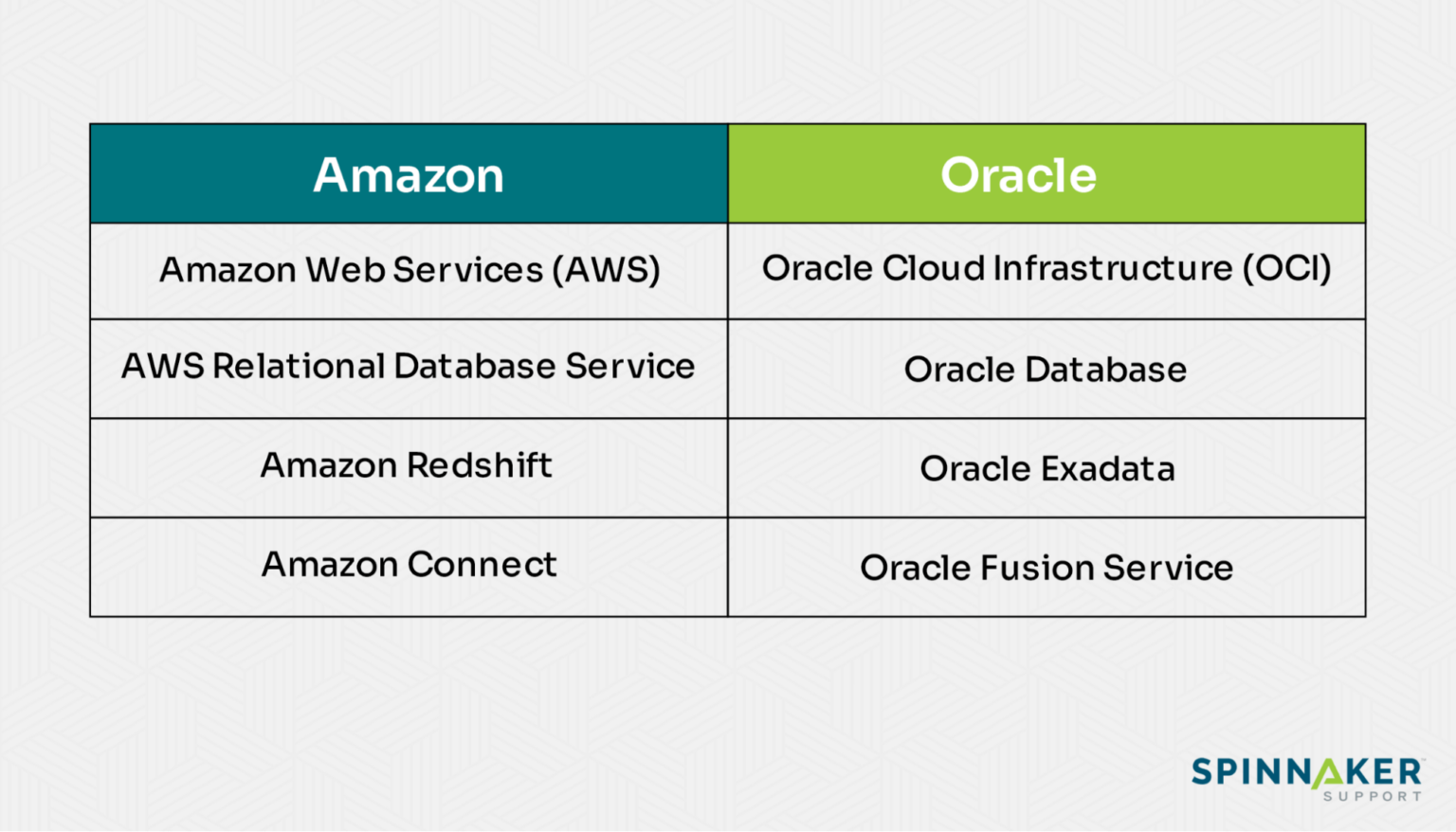
Amazon is known for its retail offerings, but a significant portion of its trillion-dollar valuation comes from digital services, including many that compete with Oracle. These include:
Amazon Web Services (AWS)
AWS is Amazon’s cloud computing platform that commands a leading 32% market share, leagues above OCI’s 2%.
Which cloud platform is right for you? We can help you decide. For example, when a US bank with over 750 branches approached Spinnaker Support looking to move on from legacy hardware, we evaluated their needs and found that the best solution was to migrate operations to AWS. Aside from the benefits of not needing to maintain in-house infrastructure, the bank achieved improved performance from automatic scaling and 24/7 availability.
AWS Relational Database Service (RDS)
Amazon RDS is a managed SQL database service that supports several different database engines, including MySQL, PostgreSQL, MariaDB, SQL Server, Aurora, and Oracle.
RDS for Oracle can be operated under either of two license models: “Bring-Your-Own-License (BYOL)” and “License-Included.” Under the latter, if you don’t have an existing Oracle license, AWS will license it on your behalf.
Amazon Redshift
Amazon Redshift is a cloud data warehouse built for big data processing. It’s a competitor to Oracle’s Autonomous Data Warehouse and, to an extent, Exadata.
It ingests semi-structured data from a wide range of sources, from data lakes to warehouses, and analyzes it to derive business insights using SQL.
Amazon Connect
Amazon Connect is a customer experience (CX) offering that rivals Oracle Fusion Service. It allows businesses to create a cloud contact center and onboard their agents with tools such as conversational analytics and visual workflow designers for improved productivity.
3. Salesforce
Founded: 1999
Founders: Marc Benioff, Parker Harris, Dave Moellenhoff, Frank Dominguez
Headquarters: San Francisco, California
Revenue: $31.4 billion
Value: $197.59 billion
Employees: 79,390
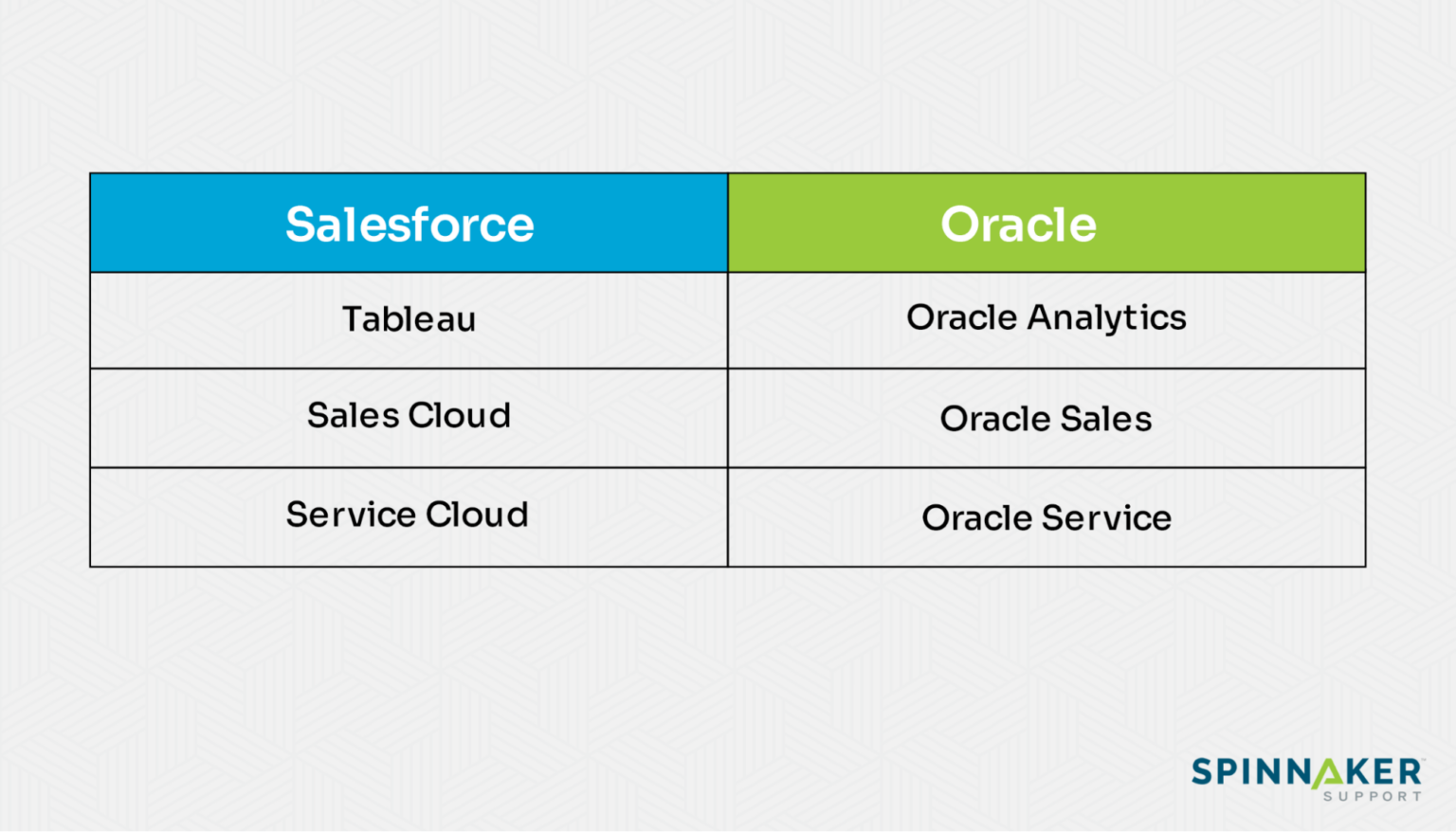
Salesforce is the global leader in customer relationship management (CRM), with a 21.9% market share against Oracle’s 5%. Salesforce alternatives to Oracle products include the following:
Tableau
Salesforce acquired Tableau, the world’s second-largest BI platform and a major rival to Oracle Analytics, for $15.7 billion in 2019. Since then, Salesforce has merged Tableau’s underlying business intelligence and data visualization technologies into its core platform as CRM Analytics (formerly called Tableau CRM).
Sales Cloud
Salesforce Sales Cloud, like Oracle Sales Cloud, handles the sales end of the CRM platform. It provides features for conversion and lead management.
In 2020, Spinnaker Support helped technology services company Cobham Mission Solutions transition to Salesforce Sales Cloud as it experienced rapid growth. The migration revealed unexplored business strategies and reduced the time spent in pipeline reporting by 60 hours a month.
Service Cloud
Salesforce Service Cloud handles the service side of its core CRM platform, taking over from sales teams after they convert a lead. It’s Salesforce’s alternative to Oracle Service Cloud, with features that include case management and self-service.
Spinnaker Support’s managed services for Salesforce Service Cloud offers clients many benefits, including a Customer 360 view, omni-channel processes, and integration with other systems as needed.
4. SAP
Founded: 1972
Founders: Dietmar Hopp, Hans-Werner Hector, Hasso Plattner, Klaus Tschira, Claus Wellenreuther
Headquarters: Baden-Württemberg, Germany
Revenue: $32.48 billion
Value: $156.95 billion
Employees: 111,961
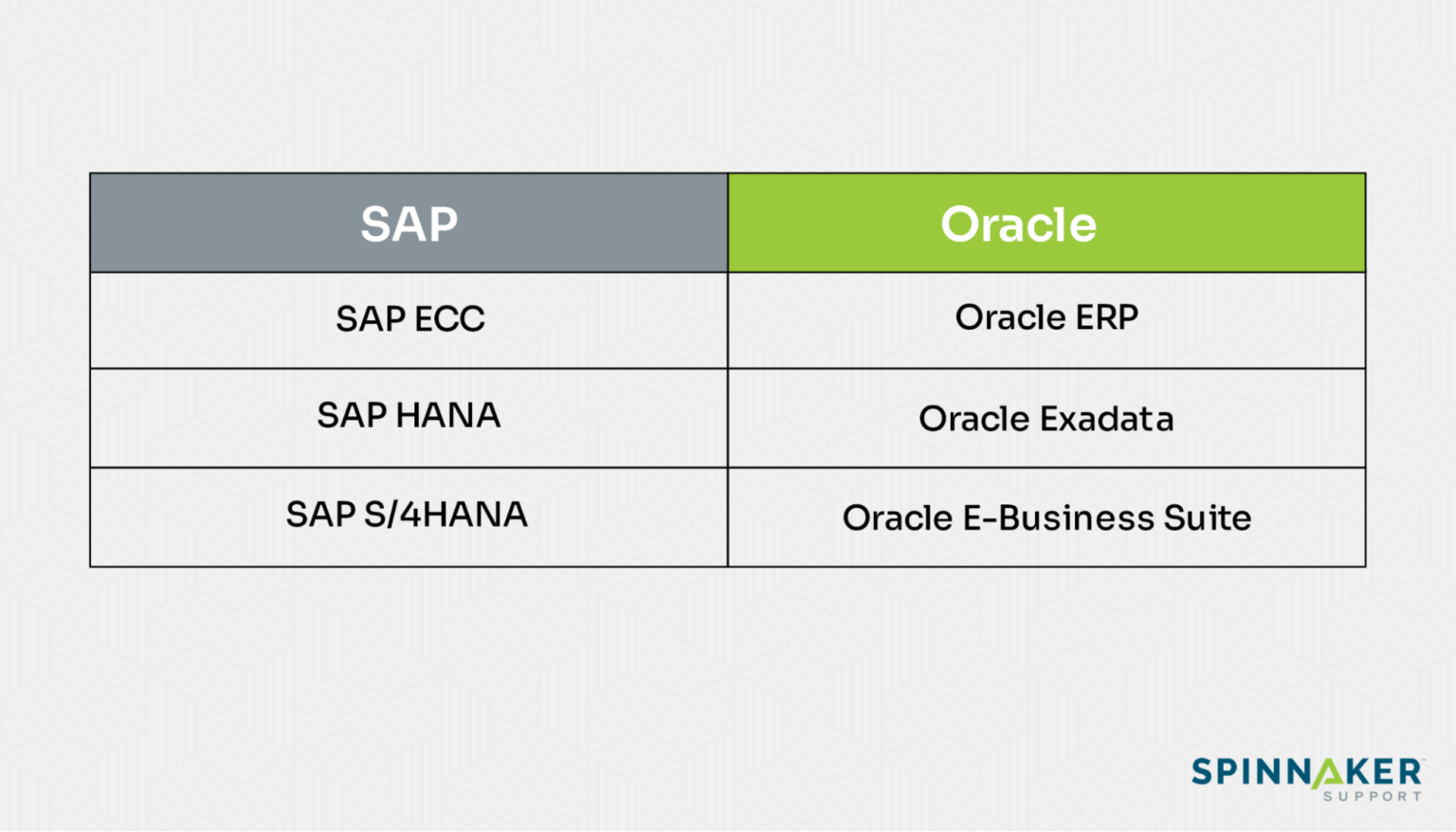
SAP is a global leader in enterprise resource planning (ERP) software for business management, with hundreds of thousands of customers across the globe. Over the years, it’s maintained direct competition against Oracle, currently doing so with:
SAP ECC
Sap ERP Central Component (ECC) is one of the industry’s oldest ERP solutions, with a history tracing back to the 1970s. Many businesses continue to rely on ECC, even as SAP is actively working to phase it out in favor of newer offerings.
Case in point: 3D design software company Autodesk was unsatisfied with the support it was getting from SAP on ECC, so it turned to Spinnaker Support. After just one year of third-party support, Autodesk reaped considerable savings that it reinvested into its operations.
SAP HANA
SAP HANA, short for High-performance ANalytic Appliance, is SAP’s database software. Like Oracle’s Exadata platform, it’s geared towards big data and is designed to work best with the respective vendor’s proprietary technologies, as discussed below.
SAP S/4HANA
SAP S/4HANA is an ERP solution built to take full advantage of the HANA database system. It is the latest flagship version of the SAP ERP, intended to replace ECC going forward, and competes with other ERP offerings on the market, such as Oracle E-Business Suite (EBS).
If you’re not eager to “upgrade” to S/4HANA on a forced timeline, you should know that there are other options. You don’t need to switch to S/4HANA and can migrate to third-party support to keep your ECC instance(s) running for as long as you need to, even after SAP’s 2027 support sunset.
5. IBM
Founded: 1911
Founders: Herman Hollerith, Charles Ranlett Flint, Thomas J. Watson, Sr.
Headquarters: Armonk, New York
Revenue: $60.58 billion
Value: $112.28 billion
Employees: 345,000
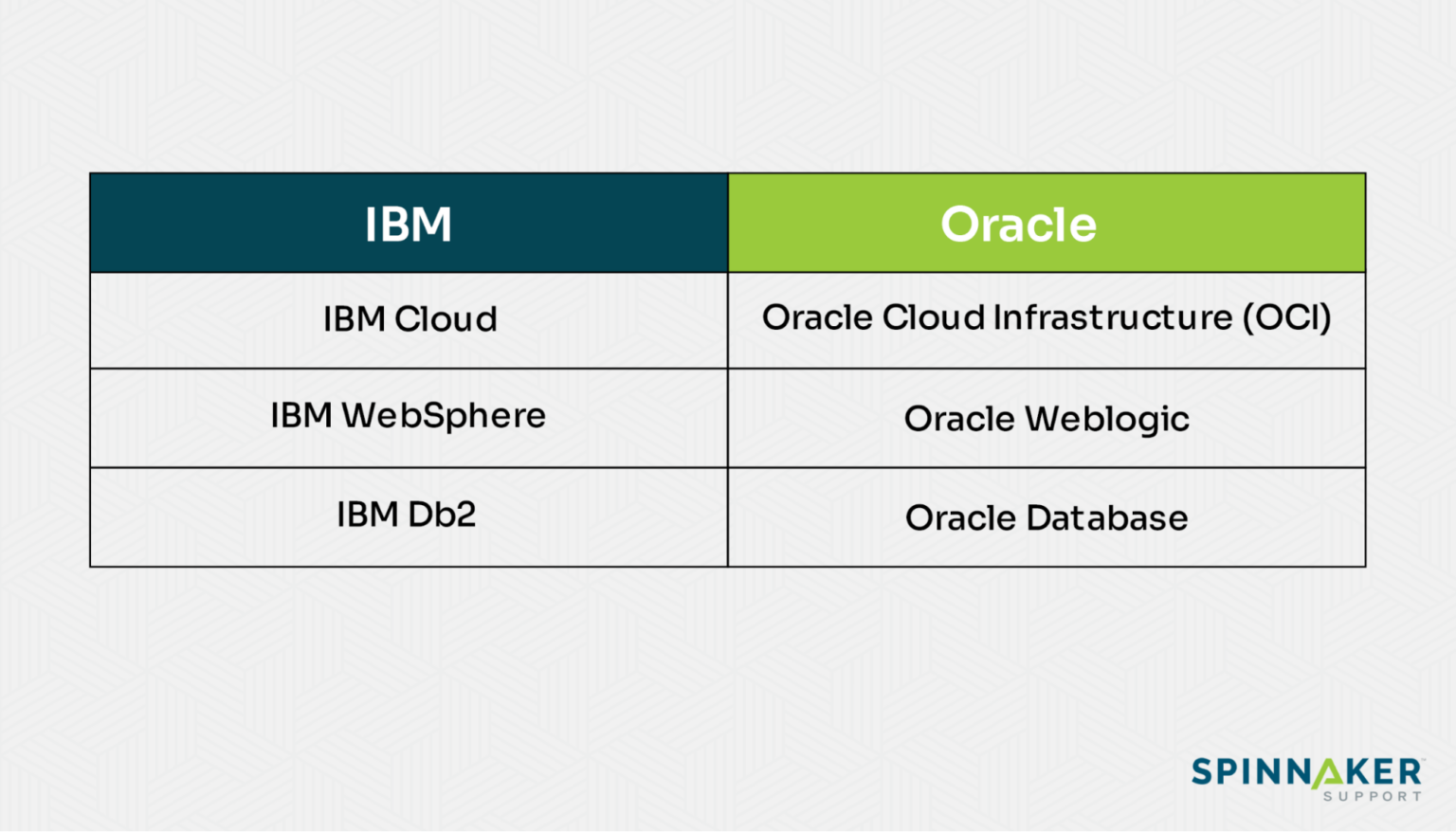
IBM is the oldest company on this list, with more than 110 years of history. While the company is past its heyday of the late 1980s, it’s still far from obsolete.
In an ever-changing tech landscape, IBM has proven that real staying power comes from being able to adapt. Many of its competitors across the century have come and gone, but the company remains both profitable and competitive.
The following products continue its decades-long rivalry with Oracle:
IBM Cloud
IBM Cloud is an open-source cloud computing platform and one of OCI’s largest competitors. It was initially called Bluemix, developed on open-source technologies by SoftLayer Technologies before IBM acquired it for an estimated $2 billion.
It’s ideal for hybrid cloud setups, where companies want to maintain private, on-premise infrastructure but also link to the public cloud for faster resource provisioning.
IBM WebSphere
IBM WebSphere is a Java runtime environment, an alternative to Oracle Weblogic. It allows businesses to stay agile by allowing them to deliver cloud-native apps faster.
While WebSphere and Weblogic are platform-agnostic, Oracle is known for aggressively nudging their Java users towards lock-in. Our third-party support and managed services could help you avoid these pitfalls.
IBM Db2
IBM Db2 is a database, the company’s alternative to Oracle Database, focusing on powering cloud-native apps. It can run on any platform, both on-premise and cloud.
6. Spinnaker Support
Founded: 2008
Founder: Matt Stava
Headquarters: Greenwood Village, Colorado
Spinnaker Support is the industry’s highest-rated provider of third-party support services, which is contracted support services offered by expert providers other than the original software vendor.
As such, Spinnaker Support competes directly with Oracle’s vendor support offerings for products such as:
- Agile Product Lifecycle Management (PLM)
- ATG Web Commerce & Endeca
- Database
- Demantra
- EBS
- Hyperion
- Fusion Middleware
- PeopleSoft
- Retail
- Siebel CRM
Oracle has been criticized for prioritizing its own bottom line at the expense of the customer experience, with fees that seem always to climb higher.
Spinnaker Support can help by providing companies with world-class support at a lower price point than vendor offerings. We offer the option for lifetime support, so customers can continue using existing Oracle products for as long as they need rather than being forced to overhaul their systems whenever the vendor demands.
Our approach to enterprise software support unlocks tangible business benefits as outlined in the table below:
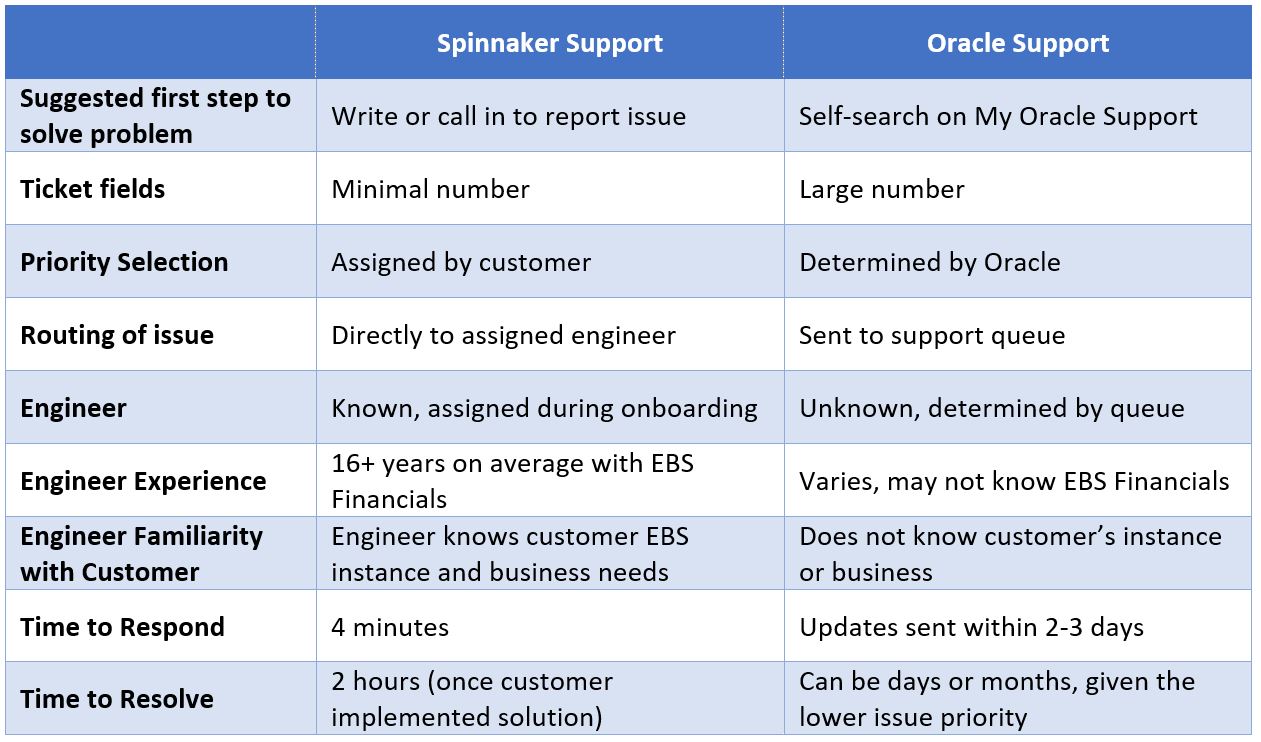
All in all, third-party support saves companies an average of 60%, which they can redirect into their operations.
Moreover, we also provide managed services for a host of Oracle products, so you don’t need to maintain an in-house IT team. We assign ITIL Level 2 and 3 experts, with Level 4 teams on standby, so your systems are at peak performance 24/7/365.
If you like Oracle products but you’re feeling disillusioned with the company’s business practices, some direction from our consultants might help you chart the most optimal path forward.
Conclusion
As massive as Oracle is in the enterprise software space, it’s not the only game in town. Most of its products compete with alternatives from tech giants like Microsoft, Amazon, IBM, Salesforce, and SAP.
Oracle isn’t just flanking competition for its products; its services also have rivals. Spinnaker Support provides managed services and third party support for Oracle’s enterprise software. The benefits of adopting this model include reduced IT expenses, lifetime support, and speedy response times.
Contact us today to find out how you can get the most out of the IT systems that power your business.


